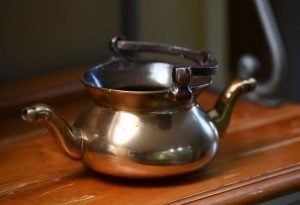When Things Are More Than Things

Alex Goldschmidt had managed to build a good life for his wife and children. Owning and operating a clothing store in pre-World War II Germany allowed them to have many of the finer things life had to offer, including a beautiful home that easily accommodated the family of six. But they were Jews, and the Germans had fallen prey to the leadership of the Nazis. Little by little, the Goldschmidts were forced to sell the sculptures, paintings, and other objects of art that graced their home—and eventually, in November of 1932, they were informed their house would also have to be sold. Being Jews, they were no longer allowed to own something so fine. Parting with it for far less than its true value, they moved from place to place, each one smaller than the last.
Six years after the Goldschmidts were forced to leave their home, thousands of Jewish owned shops and synagogues were destroyed throughout Nazi Germany, and 30,000 Jewish men were arrested in what would become known as Kristallnacht, or the Night of Broken Glass. Alex was among those taken into custody. A year later, he and his son Helmut managed to board the S.S. St. Louis, a ship bound for Cuba, hoping to find a safe haven for the remainder of his family. But Cuba turned the ship away, as did the United States and Canada. With no other recourse, they returned to Europe. Alex and Helmut would eventually die at Auschwitz. Alex’s wife Toni and his daughter Eva were killed in a forest outside of Riga, Latvia. Their other daughter managed to escape to England and their son Gunther made his way to America. Gunther had survived simply because he was a musician, playing in a company that was allowed to tour the country. Their existence was a form of Nazi propaganda, a means of showing the world the Jews were not being persecuted. It was during this time that Gunther met his future bride Rosemarie who was a violinist with the same group. The company was forced to disband in 1941, but Gunther and Rosemarie had already fled the country, escaping to safety just in time.
Upon arrival in the United States, they changed their last name to Goldsmith with Gunther Ludwig becoming George Gunther. He and Rosemarie raised their two sons in St. Louis . . . and rarely ever spoke of their days in Germany or their Jewish heritage.
Fast forward to the fall of 2020. The sole surviving descendent of Alex and Toni Goldschmidt, their grandson Martin Goldsmith, is anxiously waiting for a package—a package being sent to him by Marcus Kenzler, a researcher with the State Museum for Art and Cultural History in Oldenburg, Germany. His task? To determine the original ownership of objects stolen by the Nazis during the war, and return them to the families from whom they were taken. The museum’s catalogue of items indicated this particular one had been sold in November of 1934, for a fraction of its value as was customary in sales forced by the Nazis. Kenzler had traced this item to the Goldschmidt family . . . and then to Martin Goldsmith.
When the package arrived, Martin carefully removed the wrappings and opened the box. Inside he found a 16 th century kettle made of brass, bronze, and iron with two spouts; it would have been used primarily for the ceremonial washing of hands. But to Martin Goldsmith, it was so much more. This was the only tangible item left from the life his grandparents built. They had touched this very kettle, used it until the day they were forced to part with it. And now, after almost 86 years, it was in his hands. He was holding something his grandparents had held. Something precious to them was now his. And as he sat, carefully examining this ancient treasure, he wept.
There are times in this life when material objects embody far more than meets the eye . . . when they become a tangible connection to the past and its inhabitants. Through the generations, many of us have been blessedly overwhelmed with the things that occupied the daily lives of our parents . . . our grandparents . . . our great-grandparents and beyond. But when all of that is lost, whether by acts of Nature or acts of man, the return of even a single item will bring great joy—and sorrow. Joy because it has made its way back to those who will treasure it most. Sorrow because of all that may have led to its loss.
There are times when the things of this world are far more than just things.
About the author: Lisa Shackelford Thomas is a fourth generation member of a family that’s been in funeral service since 1926. She has been employed at Shackelford Funeral Directors in Savannah, Tennessee for over 40 years and currently serves as the manager there. Any opinions expressed here are hers and hers alone, and may or may not reflect the opinions of other Shackelford family members or staff.
The post When Things Are More Than Things appeared first on Shackelford Funeral Directors | Blog.












